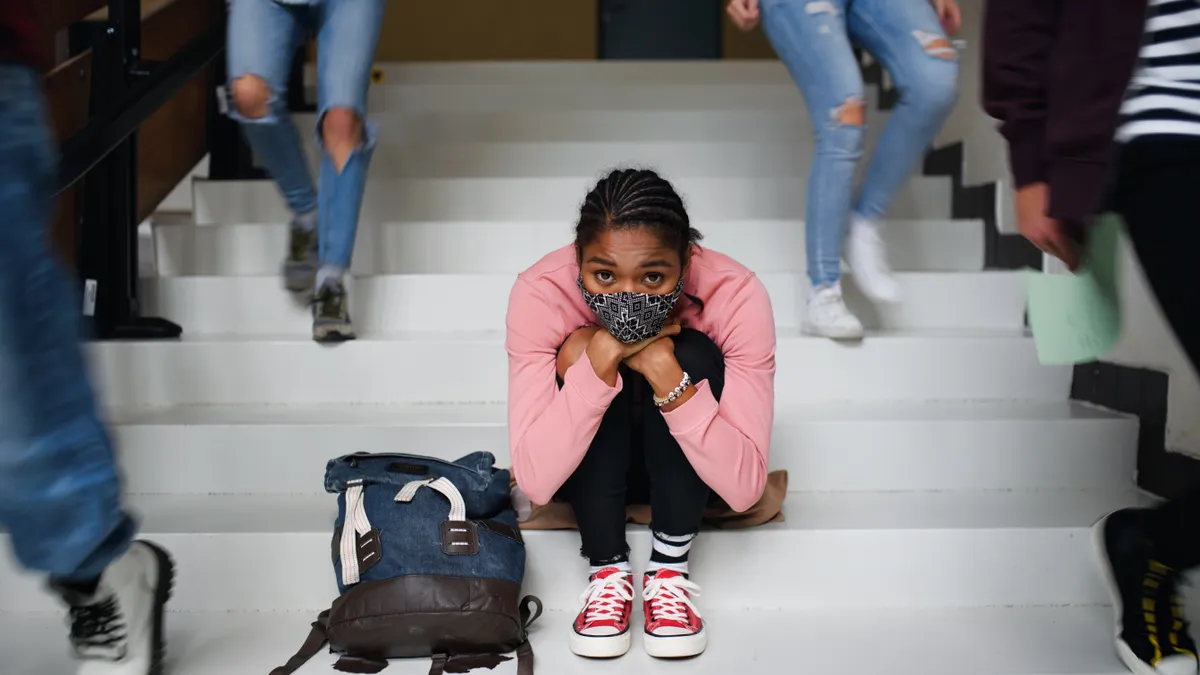Dive Brief:
-
Black and lower-income families are less likely to report the availability of mental health services in their schools compared to their White and higher-income counterparts, according to a nationally representative August study by the University of Southern California.
-
The study also found "striking patterns" relating chronic absenteeism and academic outcomes to student mental health concerns such as emotional symptoms, conduct problems and troubles with peers.
-
The findings come as at least 14 states cutting across regions and political leanings committed this week to tackling chronic absenteeism by cutting rates in half over the next five years.
Dive Insight:
While over half of White and higher-income families surveyed said they have mental health services available in school, only 29% of Black families and 37% of the lowest-income families — those with household income under $25,000 — reported the same.
The study linked mental health struggles to higher rates of absenteeism and lower school grades, although the findings suggest correlation rather than causation, according to the report.
Students on pace to be considered chronically absent — defined as missing 10% or more of a school year — scored abnormally on an assessment of "conduct problems" at four times the rate of peers with five or fewer absences.
Mental health challenges were also linked to academic outcomes. Students who earned mostly Cs or lower in at least one subject area were 2 to 4 times more likely to have abnormal scores in mental health measures.
"Our data support the interconnected nature of student needs; to improve their academic outcomes, schools also must focus on mental health and attendance," researchers wrote.
Students' worsening mental and behavioral problems, soaring chronic absenteeism rates, and academic struggles have been chief among school and policy leaders' priorities on the road to recovery from COVID-19.
On Monday, at least 14 states signed on to a challenge issued by Attendance Works to address the chronic absenteeism problem by cutting rates in half from the highs seen during the pandemic.
"Sustained high rates of absenteeism threaten students’ social, emotional, and academic development," said Attendance Works, which advocates for regular school attendance, and other education organizations said in announcing the states' commitment.
The states accepting the challenge include:
- Alabama
- Arkansas
- Colorado
- Connecticut
- Iowa
- Maryland
- Nebraska
- Nevada
- New Mexico
- Ohio
- Rhode Island
- Virginia
- Washington
- West Virginia
“The reasons for chronic absenteeism are varied, from health and transportation challenges to harmful discipline practices to a lack of authentic and culturally responsive family engagement," said Denise Forte, president and CEO of EdTrust, one of the groups involved, in a statement on Monday. Forte added that education leaders should make addressing chronic absenteeism "a top priority this year," particularly for Black, Latino and low-income students "who are too often inadequately supported by their schools.”
In fact, the August study found that while school districts used pandemic federal aid to increase their mental health services, students and families most in need of the services are the least likely to have them available. Meanwhile, while White and higher-income households are more apt to have mental health services available to them through public schools, they are also more likely to find that help outside of school, the report said.
Approximately 1 in 5 respondents — especially Black and Hispanic families — said they would have signed their child up for mental health services if they were available.
"Real needs continue to be unmet," the report said.
The study was based on a survey administered beginning in March 2020 by USC's Center for Economic and Social Research of more than 14,000 households nationwide.














